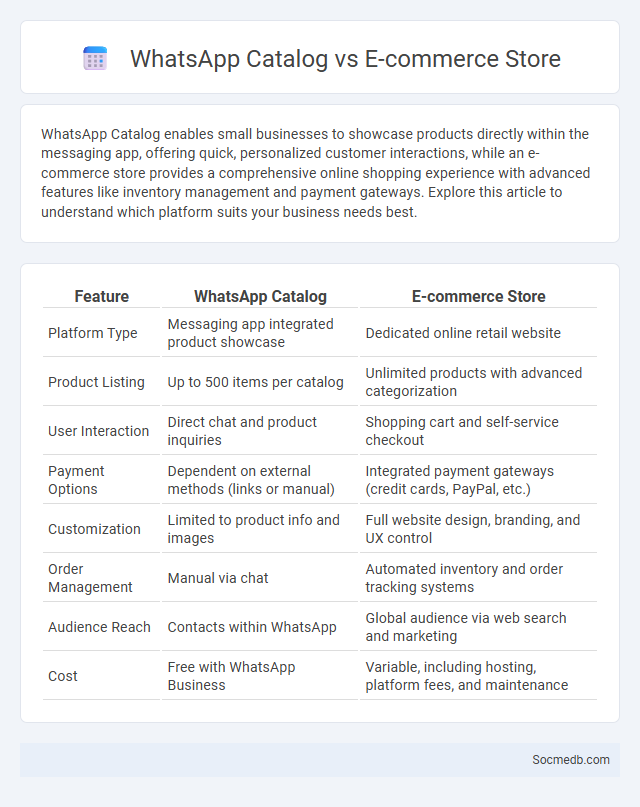
Photo illustration: WhatsApp Catalog vs E-commerce Store
WhatsApp Catalog enables small businesses to showcase products directly within the messaging app, offering quick, personalized customer interactions, while an e-commerce store provides a comprehensive online shopping experience with advanced features like inventory management and payment gateways. Explore this article to understand which platform suits your business needs best.
Table of Comparison
| Feature | WhatsApp Catalog | E-commerce Store |
|---|---|---|
| Platform Type | Messaging app integrated product showcase | Dedicated online retail website |
| Product Listing | Up to 500 items per catalog | Unlimited products with advanced categorization |
| User Interaction | Direct chat and product inquiries | Shopping cart and self-service checkout |
| Payment Options | Dependent on external methods (links or manual) | Integrated payment gateways (credit cards, PayPal, etc.) |
| Customization | Limited to product info and images | Full website design, branding, and UX control |
| Order Management | Manual via chat | Automated inventory and order tracking systems |
| Audience Reach | Contacts within WhatsApp | Global audience via web search and marketing |
| Cost | Free with WhatsApp Business | Variable, including hosting, platform fees, and maintenance |
Introduction to Digital Selling Platforms
Digital selling platforms revolutionize commerce by integrating social media networks with e-commerce capabilities, enabling businesses to reach targeted audiences more effectively. These platforms utilize data analytics and personalized advertising to drive customer engagement and streamline the purchasing process directly within social channels. Leveraging features like shoppable posts, influencer partnerships, and real-time customer interactions enhances conversion rates and brand visibility in competitive digital markets.
Overview of WhatsApp Catalog
WhatsApp Catalog enables businesses to showcase products and services directly within the app, facilitating seamless shopping experiences for users. The feature allows companies to create visually appealing product listings with detailed descriptions, prices, and images, enhancing customer engagement. By integrating WhatsApp Catalog, businesses can streamline communication, reduce response time, and drive sales efficiently on a widely used social media platform.
What is an E-commerce Store?
An e-commerce store is a digital platform where you can buy and sell products or services online, providing a seamless shopping experience through social media integration and secure payment gateways. These stores utilize social media marketing to reach a wider audience, boosting visibility and driving traffic directly from platforms like Instagram, Facebook, or Pinterest. Your ability to manage product listings, customer interactions, and sales analytics in real-time significantly enhances business growth and customer engagement.
Understanding Product Catalogs
Product catalogs on social media platforms organize your inventory into easily navigable sections, enhancing product discovery and boosting customer engagement. By integrating a well-structured catalog, you enable dynamic ads that automatically showcase relevant products based on user behavior, increasing conversion rates. Optimizing your product catalog with detailed descriptions, high-quality images, and accurate pricing ensures seamless shopping experiences and drives higher sales performance.
Setup and User Experience Comparison
Setting up social media accounts involves selecting platforms such as Facebook, Instagram, Twitter, or TikTok, each providing distinct onboarding processes tailored to their target demographics and content formats. User experience varies significantly, with Instagram emphasizing visual content and intuitive navigation, while Twitter prioritizes real-time updates and concise messaging, and TikTok offers algorithm-driven personalized video feeds for enhanced engagement. The ease of customization, privacy settings, and content discovery tools directly impact user satisfaction across these platforms.
Features: WhatsApp Catalog vs E-commerce Store
WhatsApp Catalog offers a streamlined feature for showcasing products directly within chat, allowing you to create a simple, interactive display of items with descriptions and prices for quick customer browsing. E-commerce stores provide a comprehensive platform with advanced features such as inventory management, payment gateways, customizable product pages, and detailed analytics to drive sales. Your choice depends on whether you want immediate, conversational sales through WhatsApp or a fully functional online shop with extensive marketing tools.
Payment and Checkout Processes
Streamlining payment and checkout processes on social media platforms enhances Your purchasing experience by reducing friction and minimizing cart abandonment rates. Integrating secure payment gateways and one-click payment options allows customers to complete transactions swiftly without leaving the app. Optimized checkout systems on social media significantly boost conversion rates and customer satisfaction by providing convenience and trust.
Marketing and Customer Engagement
Social media platforms drive marketing success by enabling targeted advertising and real-time consumer insights, boosting brand visibility and conversion rates. Leveraging tools like Facebook Ads Manager and Instagram Shopping enhances customer engagement through personalized content and interactive features such as polls and stories. Data analytics from social media channels provide measurable ROI, facilitating strategic adjustments that optimize campaign performance and strengthen customer loyalty.
Pros and Cons of Each Platform
Facebook offers extensive networking opportunities and robust advertising tools that benefit businesses and individuals alike but faces criticism for privacy concerns and misinformation spread. Instagram excels in visual content sharing and influencer marketing, driving engagement through photos and stories, though its algorithmic feed can reduce organic reach and impact mental health. Twitter enables real-time conversations and news dissemination, fostering rapid information flow, but struggles with character limits and the prevalence of online harassment.
Choosing the Right Platform for Your Business
Selecting the right social media platform depends on understanding your target audience and where they primarily engage online, such as Instagram for visual brands or LinkedIn for B2B companies. Analyzing platform demographics and content formats ensures your marketing efforts align with user behavior and maximize ROI. Prioritize platforms offering advanced analytics and advertising options to refine campaigns and drive business growth efficiently.
 socmedb.com
socmedb.com